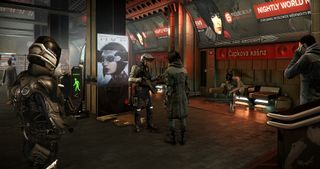Deus Ex: Mankind Divided is a game about real people and difficult choices
Deus Ex: Human Revolution is a cerebral take on a concept we’ve seen countless times before. It makes you think about augmentation in human terms, rather than reducing it to simple perks and brutal melee takedowns. While you can easily see the effects of the cyber-renaissance embedded in the flesh of Adam Jensen, the world itself often feels sparse and superficial. Deus Ex: Mankind Divided promises to take us deeper.
The hands-off portion of our Mankind Divided demo begins exactly how you’d expect. Adam Jensen - gruff, damaged, devilishly pointy - is rudely awoken by a request to help contain some fresh disaster. He’s holed up in a sticky Prague apartment that feels torn from the pages of a JG Ballard short. Pristine tech sits atop battered furniture, dust swirls in the slatted sunlight. It’s a welcome return to taut, neo-noir setting of the first game.
Jensen is at the centre of a global catastrophe - the so-called ‘Aug Event’, which drove augmented people across the globe into violent rages, resulting in 50 million deaths. The bad news for Jensen is that anti-augmentation movement is at its most fervent in Prague. It’s a dangerous situation for a man constructed entirely from robotic fist-chisels. Worse still, neuropozyne, the drug required for controlling the human body’s rejection of augmentations, is only available from the black market. Not only is Jensen in the worst place he can be, he’s also in desperate need of a service.
The tension increases when Jensen heads to the streets. He’s coldly questioned by police officers, and there’s a sense it could all turn violent at any moment. As you’d expect from Eidos Montreal, it’s a wonderfully realised world. Sci-fi trappings are bolted onto the historic city, and the fact they’re so incongruous just helps increase the sense of oppression. Unlike the gloom of the previous games, Prague is bathed in sunlight and autumnal colours. Nothing feels right, but it’s oddly beautiful nonetheless. At one point, we’re shown the entrance to an underground station, with one queue for normal humans and another for the augmented. It’s an effective, if unsubtle, allusion, hammering home the theme of mechanical apartheid. Most interestingly, even at this early stage, you don’t have to follow the rules. There’s nothing stopping you from choosing the route for normal humans except for the armed police officers who patrol every corner of Prague. You’re free to make violent mistakes.
Jensen is part of an Interpol unit called Task Force 29 - a group which deals with augmented terrorists. It’s a complicated space for Jensen to occupy, not least because they’re located in the Czech capital. He has a strained relationship with the rest of Task Force 29, and I get a glimpse of this when I get to play the Dubai level we’ve covered before. Some of the team are suspicious of Jensen, which is quite understandable given the situation. As we fly to the objective, one colleague articulates his feelings about augmented humans, but it’s smartly handled - the kind of undermining snark that makes him feel like a real person, not just a flimsy antagonist.

The greatest compliment I can pay Deus Ex: Human Revolution is that the stuff I saw in Prague helped me make my decisions in Dubai. I chose non-lethal methods in the vague hope that I could somehow atone for the Aug Event. I wanted to show the doubters in Task Force 29 that I was more than just a time bomb in sharp sunglasses. I managed to get through most of the level without taking a single life (except for one sorry exception, when the urge to use fist-chisels overcame me). I chose the most peaceful resolution in the boss fight, even though a reckless shootout would have been more fun. This is also a useful example of how the boss battles now offer multiple approaches. I sprint in behind line of fire, using the distraction to reach my objective unnoticed, rather than destroying everything. It’s great to have the choice, and a welcome departure from the first game.
This, then, is perhaps this is the smartest thing about Deus Ex: Mankind Divided, and comes back to a point made in our earlier preview. It’s a game that requires context to work. It’s not enough to know that your version of Adam Jensen isn’t a bad guy: you have to understand why your peers might distrust you, and try to win their support. That’s why the stuff in Prague is so resonant. You’re given a humane snapshot of how people are feeling on both sides of the conflict, and it tempered everything I did in my demo. There’s still a place for satisfying sniper shots and pinning people to walls with Jensen’s snazzy new nanoblades, but the emphasis on human cost adds a pleasing level of depth. Deus Ex: Mankind Divided will succeed or fail on the quality of the story, but it’s already a world I want to know more about.
Sign up to the 12DOVE Newsletter
Weekly digests, tales from the communities you love, and more
Most Popular



